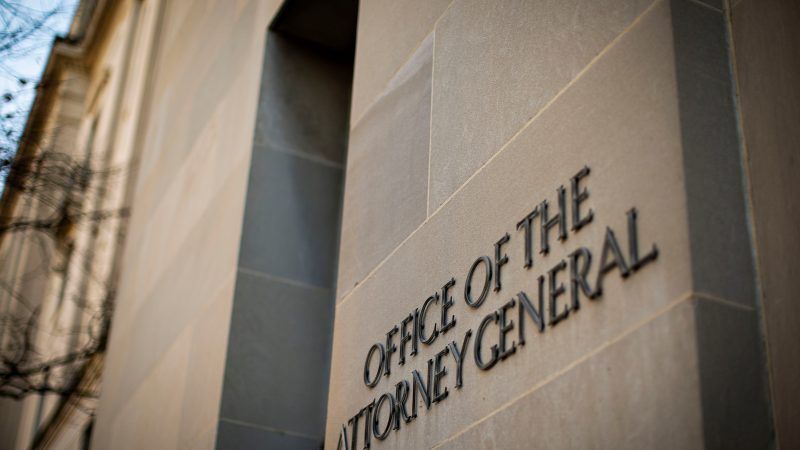Justice Department Says a Small Mississippi Town Ran a Dickensian Debtor's Prison
Federal investigators say police in Lexington, Mississippi, used illegal searches, excessive force, and kept residents in jail when they couldn't pay off old fines.

A Justice Department investigation concluded that a small Mississippi town piled more than $1.7 million in fines on its residents and then jailed them in an unconstitutional debtor's prison when they couldn't pay up.
The Justice Department's Civil Rights Division released a report Thursday detailing a litany of alleged constitutional violations by the 10-member police department of Lexington, Mississippi, a majority-black town of about 1,200 people. Justice Department investigators found that Lexington police violated residents' rights at every stage: engaging in illegal traffic stops and searches, unconstitutionally jailing residents for unpaid fines and "investigative holds," and retaliating against anyone who criticized them. That's in addition to racial discrimination and numerous reports of sexual harassment by officers. The report concludes that a complete lack of leadership and oversight has "created a system where officers can relentlessly violate the law."
"Lexington has turned the jail into the kinds of debtors' prisons Charles Dickens described in his novels written in the 1800s," U.S. Attorney for the Southern District of Mississippi Todd Gee said in a press conference announcing the report's findings. "Only this is happening in Mississippi in 2024."
The Justice Department opened an investigation into Lexington in November of 2023, a year after the former Lexington police chief resigned because he was secretly recorded using racist slurs and bragging about killing 13 people. The Justice Department report notes that, on the same day the department opened the investigation, "LPD officers chased a man accused only of disturbing a business and tased him nine times."
In 2022, the Lexington Police Department adopted an expansive arrest policy for low-level and noncriminal conduct. It paired this with aggressive debt collection practices that jailed residents for unpaid fines, whether or not they could afford to pay.
"Over the past two years, LPD has made nearly one arrest for every four people in town, primarily for low-level offenses and traffic violations," the report says. "That is more than 10 times the per capita arrest rate for Mississippi as a whole. Many of these arrests were for non-criminal conduct, like owing outstanding fines and using profanity."
Justice Department investigators found that Lexington adopted the arrest policy, its revenue from fines increased from $30,000 per year to over $240,000, roughly a quarter of the police department's budget. The Lexington municipal court is funded through the police budget, including the judge's salary. Over the same period, the amount of fines owed by Lexington residents ballooned to more than $1.7 million.
Lexington police have arrested 20 people since 2022 under a 1963 city ordinance that prohibits cursing at or ridiculing police officers, despite the fact that profanity is firmly protected by the First Amendment.
These arrests are often paired with excessive force.
"When making low-level arrests, LPD uses tactics normally reserved for serious offenses," the report says. "For example, LPD officers broke down a Black man's door to arrest him for swearing at a public official," the Justice Department report says. "In another case, while attempting to arrest a man for having a tinted windshield, officers followed the man's car to his house, forced their way into his home, and tased him for 15 seconds."
The Justice Department also found LPD officers inflated or created bogus charges to collect additional fines and illegally held people in jail without probable cause for "investigative holds." Once in jail, the department refused to release people until they paid off old fines, in addition to a $50 "processing fee," regardless of whether they could afford to. Holmes County, which includes Lexington, is one of the poorest counties in Mississippi.
Those who complained, criticized, or even tried to document the Lexington police faced illegal retaliation. The report notes a highly publicized incident last year when LPD officers arrested a civil rights attorney for filming a traffic stop.
"I wrote more tickets for that lawyer the other night; that's because she had diarrhea of the mouth, y'all," the arresting officer said the next day, according to the Justice Department report. "Didn't know when to shut up."
In another instance, Lexington officers jailed a woman for alleged unpaid fines after she posted a comment on Facebook criticizing a traffic stop. "Body-worn camera footage shows that, after handcuffing the woman an LPD supervisor said, 'Let's see if she gon' put that one on Facebook.'"
"The officers fist bumped," the report says. "The woman, who was pregnant at the time, was jailed for five days without access to court."
The Lexington investigation is the latest by the Justice Department detailing widespread civil rights violations by police departments.
In June, the Justice Department released the findings of a similar "pattern or practice" probe in the Phoenix Police Department. Investigators documented incidents where Phoenix police fabricated incident reports, needlessly used physical force and dangerous restraints, illegally detained homeless people and destroyed their property, delayed medical aid to wounded suspects, and assaulted people for criticizing or filming them.
Last year the Justice Department also released reports on pervasive civil rights violations by police in Minneapolis and Louisville.
Those are major police departments, though. The Lexington report is notable because it is the sort of small speed-trap town that usually escapes scrutiny. In 2022, the tiny town of Brookside, Alabama, became a national news story when the Birmingham News reported that its mayor and police chief were using wildly excessive fines and forfeitures to bankroll its government.
The Lexington Police Department declined to comment on the report.


Show Comments (27)